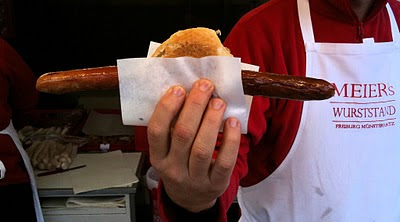 |
| Mr. Meier, at his Wurststand, proudly holds up Freiburg's Rote in a Brötchen for an iPhone photo shoot. Note the brin of an onion looking out on top of the bun. |
Mind you. The idea of vegetarian meat ersatz has been introduced previously. In the Vegetarian Journal, you can already read as early as 2000: Veggie burgers and dogs are generally lower in calories and fat than hamburgers and hot dogs. Even extra lean ground beef gets more than half its calories from fat; most veggie burgers have less than 20% of calories from fat. Meat has no fiber; most veggie burgers have at least 3 or 4 grams of dietary fiber per serving. While veggie burgers have little or no cholesterol, a 3.5-ounce hamburger with extra lean ground beef has 90 milligrams of cholesterol. Veggie burgers, especially those made with soy, contain generous amounts of protein and iron. Vitamin B-12 is added to some veggie burgers. The only negative for veggie burgers is that most are higher in sodium than ground beef.
I don't know about the quality of veggie burgers in the States, but those I have tasted in Germany were awful. Perhaps, unlike in the States, the ones sold here contain less salt. That indeed makes them 120% healthy food, but uneatable too.
Veggie dogs are also lower in calories, fat, and cholesterol than hot dogs. Some veggie dogs have more protein and iron and less sodium than hot dogs. Both hot dogs and veggie dogs contain little or no fiber. So what will a roasted tofu wurst served at a vegetarian booth here in Freiburg contain?
In the States, they already sell the Veggie or the somewhat speedier Leaner Wiener, the Meatless Frank (the poor guy), the VegiDog, and the slightly hotter Veggie Chili Dog. Take a Tofu Pup when you don't like adults served (a Wiener and Frank). There is a SoyBoy Not Dog on the market for all those cat lovers.
Since none of this is roasted, what happens when you grill a tofu wurst? We may know by World Veggie Day, October 1st, 2011.
I wish you all a Happy New Year!
*












































